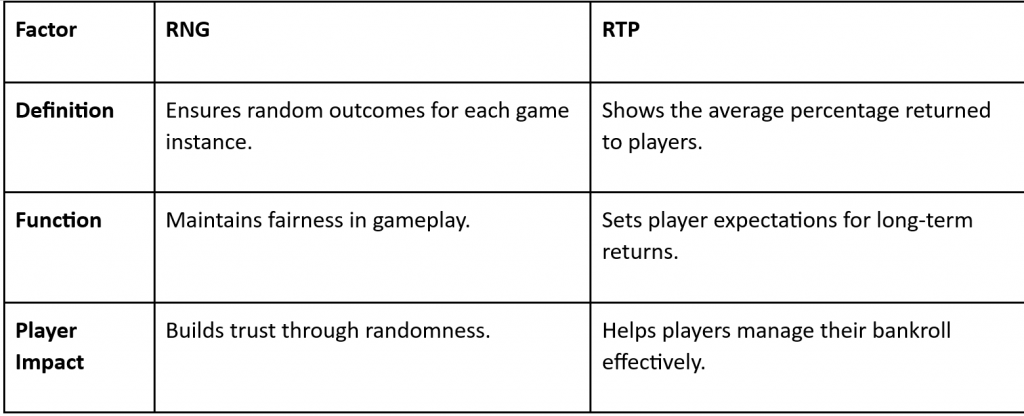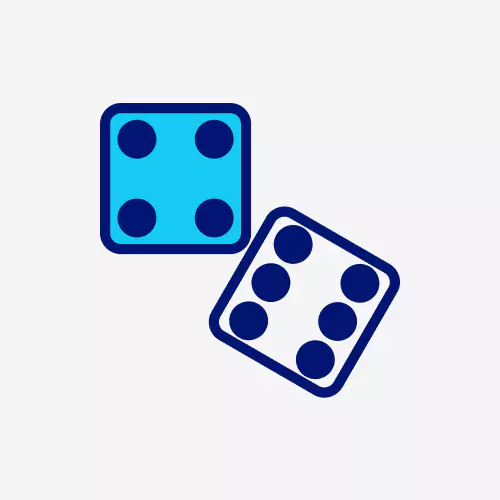Starting an online casino or adding new features to an existing platform can feel overwhelming. You might worry about how to maintain fairness in your games and build trust with your players. Without a reliable system, your gaming experience could suffer, and so could your reputation.
This is where Random Number Generators (RNGs) come in. They ensure every game outcome is random and unbiased, keeping players engaged and confident. In this blog, you will explore the different types of RNGs, how they operate, and why certification is vital.
What is RNG?
A Random Number Generator (RNG) is an important part of online gaming. It creates random sequences that make games fun and unpredictable. Here’s what you need to know about RNG:
- Random Outcomes: RNG decides things like what card you draw in poker or what symbols appear on a slot machine. Each result is random, keeping players engaged.
- No Predictability: RNG ensures that game results are random, preventing players from guessing what will happen next. This keeps the gameplay exciting and fresh.
- Fair Play: RNG gives everyone an equal shot at winning. Whether you’re playing blackjack or spinning the reels, no one has an unfair advantage.
- Variety in Games: RNG allows for different game scenarios each time you play. This means you can enjoy a unique experience every session.
- Keeps Players Interested: The element of chance in games makes players more invested in the outcome. You never know what will happen next.

For example, in an online slot game, the RNG determines where the symbols land after each spin. This means every spin is different, and players can’t predict the next result.
To dive deeper into how RNG impacts game development, check out our article on Custom Game Development to see how tailored solutions can enhance player experiences.
How RNG Works in iGaming?
If you’re looking to start an online casino or improve your existing platform, it’s crucial to understand how Random Number Generators (RNGs) work. RNGs are the technology that makes online gaming fair and exciting. Let’s break it down.
In the iGaming world, we primarily use Pseudo Random Number Generators (PRNGs). These generators start with a seed value. This seed is important because it kicks off the whole sequence of numbers. If someone knows this seed, they can predict the outcomes, which isn’t ideal for gaming.

To keep things random, iGaming platforms use advanced algorithms. Here are a few common types:
- Linear Congruential Generator (LCG): This uses a formula to generate numbers. It takes the current number, applies some constants, and produces the next one. It’s simple but effective.
- Lagged Fibonacci Generator: This one combines several previous numbers to create new ones, adding more complexity.
- Linear Feedback Shift Registers (LFSR): This technique mixes bits from earlier numbers to produce fresh random values.
What’s great about PRNGs is that they maintain randomness while being fast and efficient. They combine the seed with a secret key, which helps keep the number sequence unpredictable.
For tailored RNG solutions that meet your specific needs, Contact Us at Source Code Lab. We specialize in iGaming development services, including slots, live casinos, poker, and roulette.
Applications of RNG in Different Online Casino Games
Now that you know how RNG works, let’s look at how it applies to various casino games. RNG is at the heart of several popular gaming experiences:
Slot Machines
Slot machines are a prime example of RNG in action. Every spin is determined by a PRNG that selects numbers corresponding to symbols on the reels.
This means each spin is independent and entirely random, ensuring fairness. Some games even use weighted randomization to adjust symbol frequencies, adding excitement to the gameplay.
Watch this video that talks about the concept of RNG in online slots and casino games in depth, here.
Table Games
RNGs shuffle virtual decks to mimic real-life randomness in digital card games like poker and blackjack.
Algorithms like the Fisher-Yates Shuffle give each card arrangement an equal chance. In many setups, the deck is continuously shuffled after each hand, keeping the game fair and preventing predictable patterns.
Looking to develop your own table games? Our Poker Game Development Company offers tailored solutions for your needs.
Lottery and Bingo
RNGs are essential in lottery and bingo games, where they simulate draws to ensure randomness. This system guarantees that each number or card drawn is random, maintaining the integrity of the game and reflecting real-world odds.

Sports Betting
In sports betting, RNGs generate odds representing a range of potential outcomes. These odds are calculated to be as realistic as possible, providing a fair playing field and ensuring bettors feel confident in their bets.
Companies like Source Code Lab leverage industry insights to optimize RNG applications. This ensures that gaming experiences are not just fair but also engaging. By aligning the RNG systems with player expectations and industry standards, Source Code Lab enhances player satisfaction, making each gaming encounter trustworthy and thrilling.
To read in-depth about RNG in betting read: Betting Software & Technology Solutions for Virtual Sports
RNG in Game Design: Shaping Player Experience and Retention
Now that you know how RNG works and its applications in different casino games, let’s dive into how RNG shapes the overall player experience and enhances retention.
RNG injects unpredictability into games, which is key for keeping players engaged. When players log in, they want the thrill of not knowing what will happen next. This excitement drives them to return, hoping for new rewards or better outcomes.
However, it’s crucial to balance this randomness with skill. If a game leans too heavily on chance, it can lead to frustration. A great example of this balance is in XCOM. Here, RNG determines many outcomes, but players must apply tactical skills to navigate the challenges. This combination of strategy and chance creates a richer gameplay experience.
Enhancing Replayability with RNG
RNG also plays a big role in enhancing replayability. Developers can fine-tune RNG rates in various game sections to create just the right amount of challenge.
This ensures that players face engaging obstacles without feeling overwhelmed. When players know that their skills can influence the results—despite the element of randomness—they are more likely to come back for more.
Designing for Player Satisfaction
Game development companies like Source Code Lab understand the importance of designing RNG features that boost player satisfaction. By ensuring that randomness complements opportunities for strategic decisions, they enhance the overall gaming experience.
This thoughtful design approach leads to several benefits:
- Increased Player Morale: Players who feel their choices matter become more invested in the game.
- Stronger Connections: A well-balanced game fosters a deeper bond between players and the game itself.
- Higher Retention Rates: Satisfied players are more likely to return, extending the game’s lifespan.
Integrating RNG effectively into game design enhances excitement and encourages player skill development and satisfaction.

Explore how we incorporate these techniques in our Custom Game Development services, designed to meet your unique needs.
RNG vs. RTP: Key Differences and Why Both Matter
If you’re setting up an online casino or enhancing your gaming platform, understanding the difference between RNG (Random Number Generator) and RTP (Return-to-Player) is crucial. These concepts are vital for player trust and engagement.
You already know that RNG ensures random outcomes in games. It guarantees that each spin or card dealt is independent. This keeps games fair, so players can trust they’re getting a genuine chance to win.
Now, RTP (Return-to-Player) tells players what to expect in terms of payouts over time. For example, a game with a 96% RTP means that, on average, players can expect to get back $96 for every $100 wagered.

Keep in mind, though, this is just an average—it doesn’t guarantee short-term results.
Comparing RNG and RTP
Let’s break down the key differences:

How They Work Together
RNG and RTP work hand in hand. While RNG makes sure every game is fair, RTP provides insight into potential returns. Together, they create an engaging and trustworthy gaming experience.
For example, the RNG determines where the symbols land in a slot game with a 95% RTP. This balance of chance and expected returns keeps players coming back for more.
Knowing how RNG and RTP function can help you design better games and keep your players happy. By focusing on both, you can build a gaming platform players trust and enjoy.
Why Does RNG Certification Matter?
RNG certification helps build player trust. It establishes reliability and integrity in your games, which is crucial to keeping players engaged.

RNG certification guarantees that the random number generators used in your games meet industry standards. Here’s why this matters:
- Unbiased Outcomes: Certification ensures that every game result is fair and free from predictable patterns.
- Preventing Fraud: Certified systems lower the risk of manipulation.
- Building Player Confidence: Players are more likely to trust your platform when they know outcomes are genuinely random.
- Increasing Engagement: Operators that prioritize certification often see a boost in player trust and engagement.
Key Certifying Bodies
Several respected organizations specialize in RNG certification. These certifying bodies are critical in validating RNG systems:
- eCOGRA: Focuses on ensuring online gaming operators meet fair play standards.
- Gaming Laboratories International (GLI): Conducts audits and tests RNGs to ensure they comply with global regulations.
- iTech Labs: Validates RNG systems against strict industry and jurisdictional standards.
All in all, certification aids in obtaining and maintaining necessary licenses across different jurisdictions. By investing in certified RNGs, you enhance your credibility and gain a competitive edge.
Can RNG Be Manipulated? Addressing Myths and Realities
You might have heard the claim that RNGs can be easily manipulated to create unfair results. This myth can make players wary of the games they enjoy. Let’s set the record straight.
How RNGs Are Protected
To protect against manipulation, here are some key measures in place:
- RNG Certifications: Modern iGaming platforms use advanced RNG systems that undergo rigorous certification processes. These certifications ensure that the RNGs function correctly and fairly.
- Compliance Standards: Strict industry regulations help maintain fairness in gaming. Players can trust that the outcomes are determined randomly and transparently.
Secure Implementations
Organizations like Source Code Lab have made significant strides in developing secure RNG systems. Their implementations are designed to be:
- Tamper-Proof: Built to resist manipulation from outside influences.
- Continuously Tested: Regular evaluations ensure that these systems perform fairly across all games.
These practices reassure operators and players, knowing that the RNG is reliable and uncompromised. Read more about Transforming the iGaming Industry: Innovations and Software Providers in 2024 – sourcecodelab
Final Thoughts
Random Number Generators (RNGs) are vital for the success of your online gaming platform. They ensure that every game outcome is random and fair, which builds trust with your players. When they know they’re engaging with games powered by certified RNG, they can enjoy their experience, confident that the results are genuine.
Investing in high-quality RNG systems is a smart strategy for any iGaming operator. Certified RNG enhances your credibility and strengthens player loyalty. The trust your players have in your games directly influences how often they return.
This is where Source Code Lab can help. We specialize in iGaming development services, including slots, live casinos, poker, and more. By partnering with us, you can implement cutting-edge RNG systems that meet regulatory standards and elevate the player experience.
Book a demo today.
FAQs
What does RNG mean in iGaming?
RNG stands for Random Number Generator. It is a critical component of online casino games, ensuring that all game outcomes are random and fair.
The RNG works by generating a sequence of numbers with no pattern, thus maintaining the unpredictability and integrity of the game result
How is RNG certified?
RNGs need to be certified to ensure they are functioning correctly and providing truly random outcomes. Certification involves rigorous testing and evaluation by authorized RNG testing organizations.
These organizations use statistical tests, like the Chi-square and Marsaglia’s diehard tests, to check the RNG’s randomness. Regular audits are also conducted to maintain compliance with regulatory standards.
What’s the difference between RNG and RTP?
While RNG focuses on producing random outcomes, RTP, or Return-to-Player, is a measure of the game’s payout structure. RTP indicates the theoretical percentage that players can expect to win back over time in a game.
How do slots and table games use RNG?
Slots and table games utilize RNG in distinct ways. In slot machines, the RNG generates a random number for each reel spin, determining which symbols line up when the reels stop.
For table games like poker, blackjack, or roulette, RNG shuffles cards and determines game outcomes, such as where the roulette wheel stops or how dice roll. This ensures that results remain unbiased and random.






































